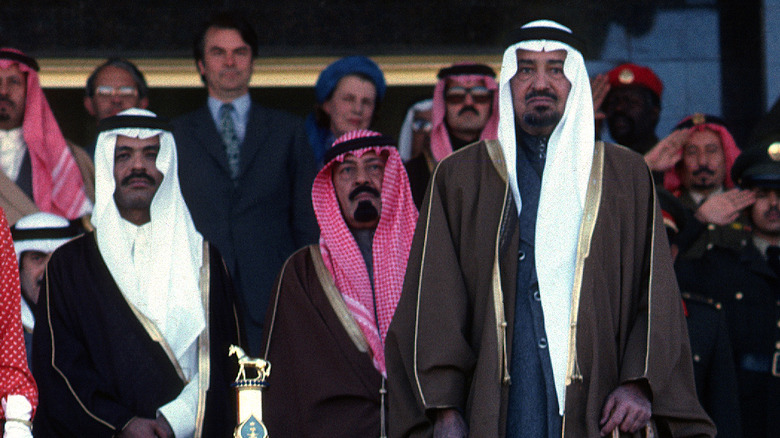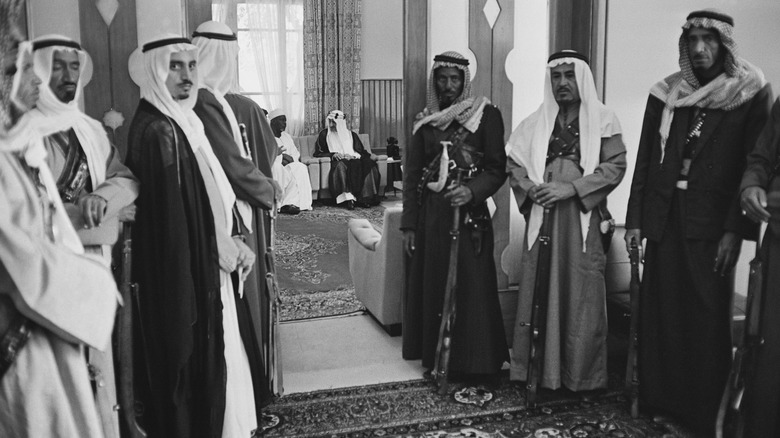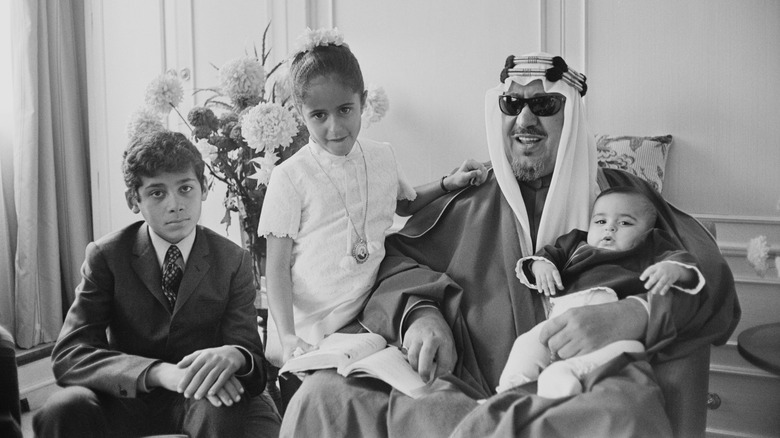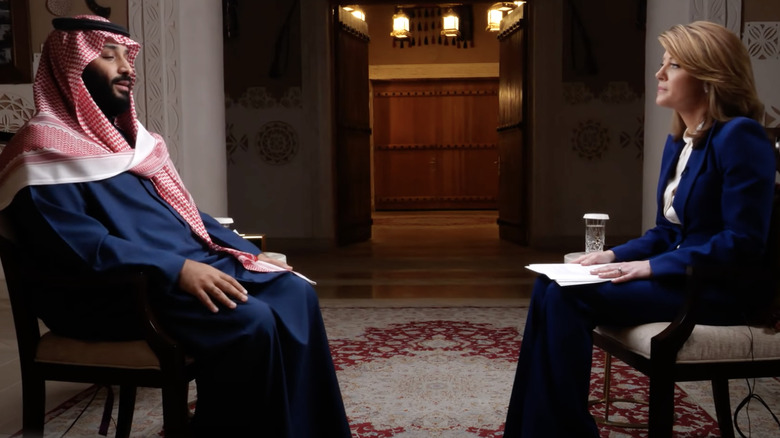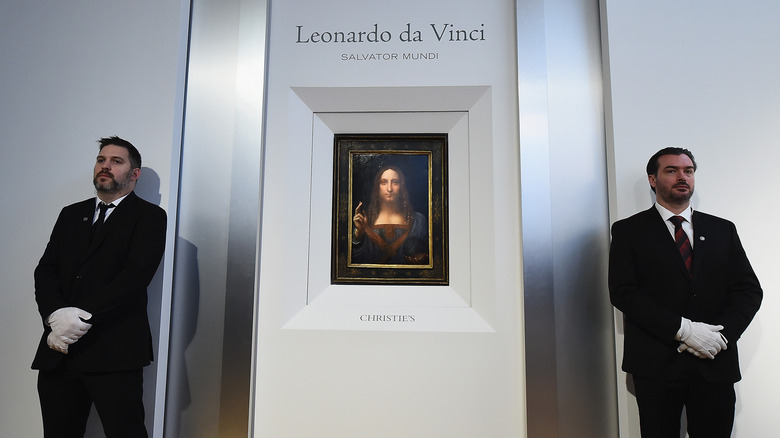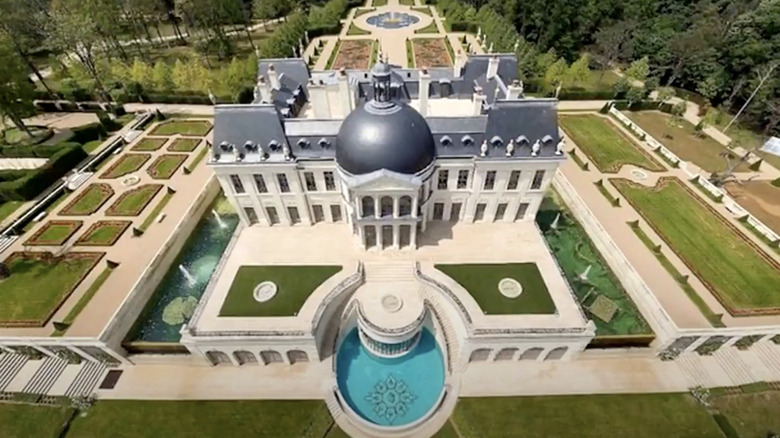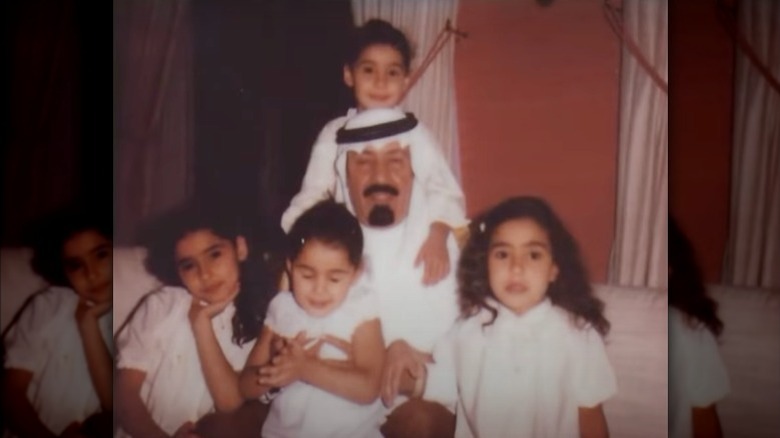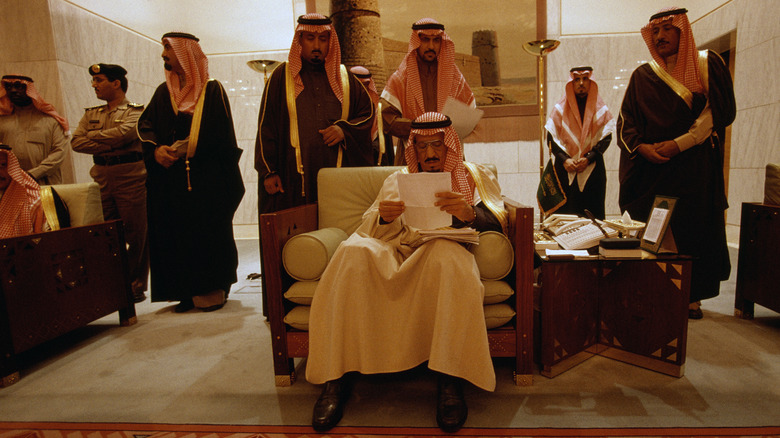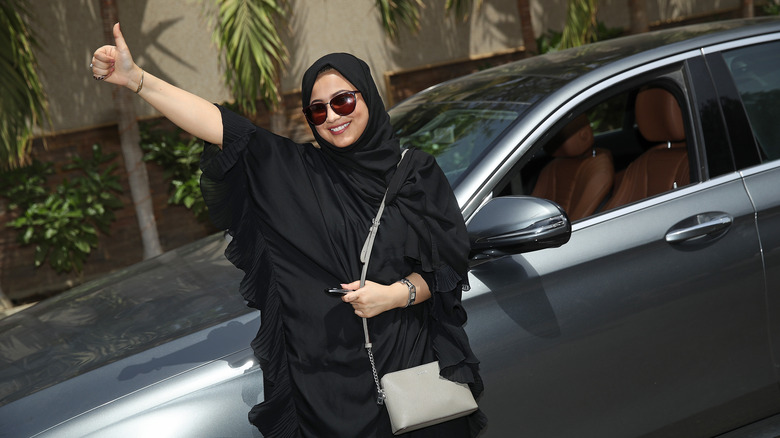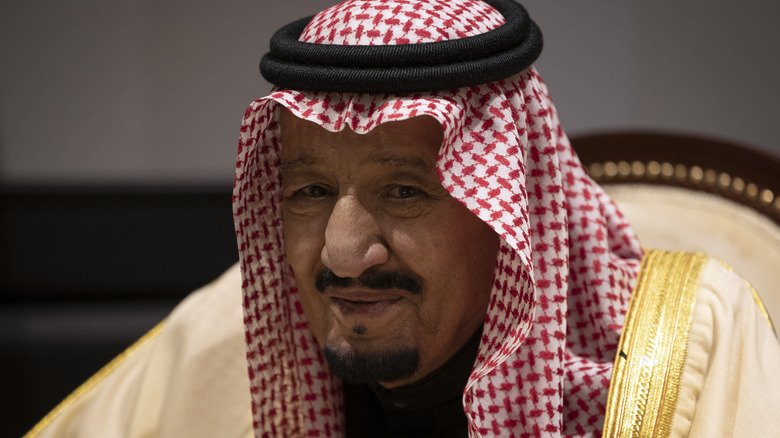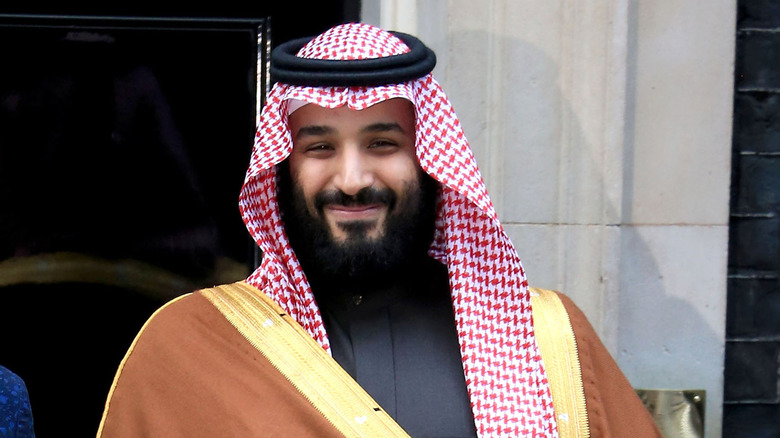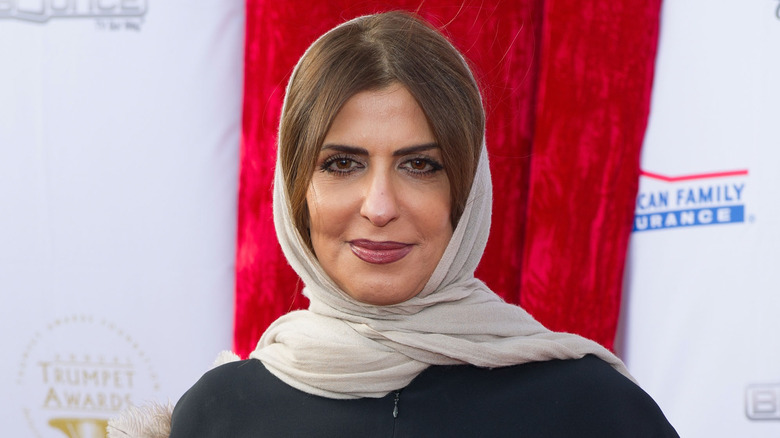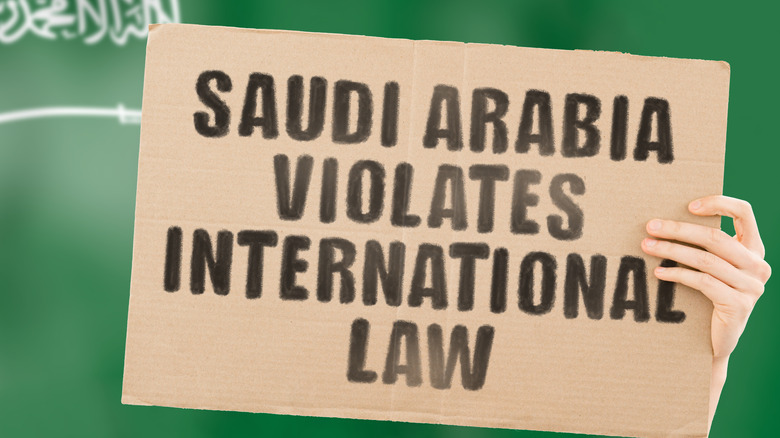The Untold Truth Of The Saudi Royal Family
The Saudi royal family is known for leading quite the lavish lifestyle while ruling over one of the wealthiest countries in the world. Still, while the House of Saud has a rich history that is definitely worth a deep dive into, the royal family's modern counterparts are just as if not more intriguing to explore, not only for their personal lives but for their controversies as well. While the kingdom is currently under the rule of King Salman, those with an interest in Saudi royals know that the king's son and heir apparent Prince Mohammed Bin Salman is essentially Saudi Arabia's ruler in all but his title. Known for having a taste for the finer things in life, MBS has come under heavy criticism for some of his actions.
Then, of course, there are the issues with Saudi Arabia's strict laws, which many critics state still haven't improved despite Saudi royals having removed some of their restrictions. To date, the kingdom still faces plenty of backlash for its cruel forms of punishment. Additionally, it isn't just Saudi laws that have faced dispute; some of the Saudi royal family have been accused of assaulting their staff, while others are alleged to have imprisoned their own relatives. With plenty of controversy surrounding the Saudi royal family as well as their leadership, many people are curious to find out the truth about the House of Saud.
The Saud dynasty can trace its origins back to the 18th century
With an extensive history, PBS provides a timeline to show the beginnings of the Saudi royal family. In 1744, the royal family's history began with the Holy Alliance, when Muhammad ibn Abd al-Wahhab arrived in the central part of Arabia and struck a deal with the local ruler and head of the Al Saud tribe, Muhammad ibn Saud. Al Saud agreed to embrace Wahhabism (a strict form of faith that al-Wahhab founded) as long as his family gained and retained political power from al-Wahhab's followers. However, while the Al Saud family's rule initially grew, the Ottoman Empire had many religious and political rulers executed in 1818, forcing the Al Saud to unsuccessfully try and reestablish their power for the following 80 years.
One of Ibn Saud's descendants, Abd al-Aziz ibn Saud (who was working to restore the rule of the Al Saud), successfully retook Riyadh (the capital of the Saudi kingdom) in 1902, as well as two Holy Cities, Mecca in 1924 and Medina in 1925. He also managed to overthrow one of his allies turned revivals, the Ikhwan (warriors who firmly followed Wahhabism). Finally, in 1932, Saud named himself king and renamed the country Saudi Arabia. In further attempts for unity, the king married women from other tribes and those connected to influential families. The marriages resulted in 45 sons, who the king went on to place into power.
The House of Saud has a large family tree
Since its modern-day founder King Abdulaziz, the passage of leadership over the monarchy has continued to the founder's male descendants. The House of Saud reports that after the first king's passing, the title was given to his successor, King Saud. Afterwhich, the power then went to the third son of Ibn Saud, King Faisal. The next ruler was King Khalid, followed by the eighth son of Ibn Saud, who became King Fahd. Finally, after Fahd died in 2005, King Abdullah (brother of King Fahd) took over and ruled for ten years before his death. Currently, Saudi Arabia's ruler is King Salman.
Similarly, in 2021, 9News reported that the ruling royal family had an estimated 15,000 members, out of which 4,000 were said to be princes serving in various government roles. Concerning the family's vast number of royals, the Independent wrote in 2012 that Princess Basma Bint Saud Bin Abdul Aziz (granddaughter of the founding king) claimed that in addition to having 15,000 members of the royal family, only about 2,000 of them actually enjoyed royal privileges. "You have 2,000 who are multi-millionaires, who have all the power, all the wealth and no-one can even utter a word against it because they are afraid to lose what they have," the princess claimed.
The Saudi royal family has a jaw-dropping net worth
If you thought that the British royal family's net worth of $88 billion was impressive, you'd definitely be stunned by the Saudi royal family's estimated wealth. According to CNBC, the House of Saud's alleged net worth is said to be around $1.4 trillion (as of 2018), which is almost 16 times the British royal family's estimation. However, the outlet did point out that it is difficult to pinpoint exact figures for the Saudi royals, as they are notably private when it comes to disclosing the extent of their finances. Still, it is known that the initial royal fortune came from oil reserves accumulated during King Abdulaziz's reign.
Reportedly, current ruler King Salman is allegedly worth $17 billion, and one of his sons, the Crown Prince Mohammed Bin Salman, is known to enjoy extremely luxurious purchases. Similarly, CBS News reported that in an interview with 60 Minutes, the Saudi royal affirmed that he believed that his finances should be kept private, saying, "My personal life is something I'd like to keep to myself and I don't try to draw attention to it." Additionally, the crown prince told the news source that he doesn't spend all his money on himself. "What I do as a person is to spend part of my personal income on charity. I spend at least 51% on people and 49 on myself."
Members of the family enjoy extremely luxurious purchases
With no shortage of wealth, it comes as no surprise that the Saudi royal family is known for living lavishly. Still, some of their pricer purchases have left some stunned. For example, in 2017, the Wall Street Journal revealed that the aforementioned Crown Prince Mohammed bin Salman (also known by his initials MBS) purchased Leonardo da Vinci's "Salvator Mundi" for $450.3 million. Similarly, the New York Post reported that MBS owns an ultra-fancy 440-foot yacht that cost him a startling $494 million. The craft allegedly has two pools and a helipad, and was said to be an impulse purchase.
The outlet added that in addition to the luxurious purchases of MBS, the royal family's extravagant lifestyle allegedly includes spending serious cash on gold-studded superyachts, private jets, palaces, and furniture made out of gold. Even down to the small everyday essentials, it's rumored that the Saudi royal family keeps things posh with gold-plated tissue dispensers.
With plenty of seemingly unnecessary extravagance, it's no shock that the Saudi royal family has faced heavy backlash for appearing wasteful with their wealth. However, it's also worth noting that certain members, such as the crown prince, aren't exactly feeling remorseful for their spending. "I'm a rich person and not a poor person. I'm not Gandhi or Mandela. I'm a member of the ruling family that existed for hundreds of years before the founding of Saudi Arabia," MBS stated during his interview with 60 Minutes.
Members of the House of Saud own homes fit for a king
Members of the Saudi royal family certainly aren't being frugal when it comes to their real estate. Notably, TRT World revealed that MBS paid more than $300 million to buy the Chateau Louis XIV, an opulent property located in France that was dubbed "the world's most expensive home" by Fortune. Also, according to the New York Post, the home is said to be fully smart-wired with everything — fountains, lights, air, heat, and sound — accessible by iPhone. Further proof that it's fit for royalty? The property also has a moat that contains sturgeon and koi which can be viewed from a transparent underwater room.
Of course, MBS is far from the only royal with living quarters fit for a king. For example, The Real Deal reported that in 2020, Saudi Prince Turki bin Nasser was selling his five-acre Beverly Park property (that has two mansions) for $40 million. Similarly, The Guardian reported that Prince Bandar bin Sultan sold his Cotswolds country estate to the King of Bahrain for over £120 million (the US equivalent of approximately $156,249,600.00). The estate includes an 18th-century Glympton House, 39 cottages, a Norman parish church, and 167 acres of parkland. The Saudi prince made quite a profit from the sale as well, initially purchasing the home for £8 million (approximately $10,419,200.00 US) and putting £42 million (roughly $54,700,800.00 US) in renovations.
The late King Abdullah put his daughters on permanent house arrest
In 2014, The New York Post reported the disturbing and tragic story of Saudi princesses Sahar, Maha, Hala, and Jawaher Al Saud, the daughters of the late King Abdullah bin Abdulaziz. Initially, the women started out leading lavish lives complete with unlimited shopping sprees, luxurious vacations in Europe, and high-end accessories like jewel-encrusted tiaras. However, according to the eldest daughter Sahar via phone interview, they are now prisoners in their home, forbidden to marry, and confined against their will.
Sahar alleged that they are being held captive because of their public views on Saudi Arabia's oppressive treatment of women. She claimed that after the sisters spoke openly about their feelings about women being illegally held and placed in mental wards, their father decided he'd had enough and punished them. Similarly, their mother told the outlet that her ex-husband was physically abusive and later divorced her without her knowledge.
She claimed that her treatment during their marriage led her to flee to London, and only a year after she left, King Abdullah began to abuse their daughters. "They had felt some oppression before I left, but when he found that I had gone, he vowed that he would kill the girls, slowly." Additionally, in an interview with a British news channel, Princess Sahar noted that because of speaking out, the sisters would likely lose access to the internet, which they say was their only connection to the outside world.
Saudi royal family members have faced allegations of abuse from former workers
According to some of their former staff, working for the Saudi royal family isn't exactly a dream come true. Initially published in 2016, an updated article by The Daily Beast reported that a Parisian decorator allegedly received some seriously unacceptable royal treatment. He claimed after going to paint a Saudi princess' apartment, he was tied up, beaten, and forced to kiss the feet of a Saudi princess. If that's not enough to make the alleged experience awful, the decorator says he was also thrown out without receiving payment for his work.
The DB added that the statement was far from the first time someone that worked for the Saudi royal family made claims about being abused. For example, the write-up stated that the prior year, Saudi Prince Majed Abulaziz al-Saud allegedly made unwanted sexual advances toward five women and was arrested after a neighbor saw a naked and bleeding woman attempting to escape his Beverly Hills home. Similarly, a 2006 report by ABC News stated that Saudi Princess Buniah al Saud was arrested and charged with felony battery for allegedly assaulting one of her maids. That incident was said to occur at the princesses' townhouse in Orlando, Florida, and the maid reportedly stated that it wasn't the first time the princess had put her hands on her.
The royal family has reversed some controversial laws
Known for having some pretty strict laws, Aljazeera states that as an absolute monarchy, Saudi Arabia has enforced harsh limitations that don't exist elsewhere for Muslim women. While some of these rules were amended in August 2019, previous laws allowed a woman who lived in Saudi Arabia to essentially be given the same treatment as a child. They were unable to receive an education, travel, work, marry, or get access to legal documents without the expressed consent of a male guardian. If that wasn't bad enough, a divorced or widowed woman could legally be under the control of her own son if he was within the appropriate age.
One of the first changes began on June 18th, 2018, when a ban that had prohibited women from legally being allowed to drive was finally lifted (a move that received worldwide praise from human rights workers). However, it's worth stating that while this is a positive change, many of the women who initially fought against the ban and other discrimination have been arrested and jailed. Similarly, in relation to other law reversals, PBS's Frontline stated that in recent years, the Saudi royals have also introduced other favorable modifications like allowing public movie theaters (which had previously had a three-decade-long ban) as well as concerts. Still, while these moves are obviously improvements over their previous status, the additional intolerance towards those who fought for change in the first place hasn't gone without notice.
King Salman took power in 2015
As previously noted, the current ruler of Saudi Arabia is King Salman bin Abdulaziz Al-Saud. According to the BBC, King Salman's rise to the Saudi throne occurred after the death of his half-brother, the aforementioned King Abdullah. The current king officially became ruler in 2015, when he was 79 years old. Before his rule, Salman was Riyadh's governor for 48 years, later becoming the defense minister in 2011 and being declared crown prince in 2012. King Salman is the youngest of seven children that the founding King Abdulaziz had with one of his wives, Princess Hassa al-Sudairi. Known for being one of the late king's favorites, Princess Hassa's seven sons are also referred to as the "Sudairi Seven" for their power and influence within the royal family.
At the beginning of his reign, King Salman initially stated that his rule wouldn't bring any drastic changes, promising to "continue adhering to the correct policies which Saudi Arabia has followed since its establishment." However, the outlet declared that the king has made more than a few alterations since taking power. Most notably, the king's son, the previously mentioned Prince Mohammed bin Salman, has risen quite steadily into power since his father's rule. First receiving a promotion to the position of the defense minister in 2015, King Salmon later named MBS the crown prince in 2017, replacing King Salmon's younger half-brother Mohammed bin Nayef who he'd previously appointed to the role.
The Crown Prince has been leading the country
Previously noted for his lavish spending and his quick rise to power, Crown Prince Mohammed bin Salman has quickly become a well-known figure to the world outside of Saudi Arabia. As noted by The Times Of Israel, though his father, King Salman, is still considered the official ruler, many of the king's duties appear to have been taken over by MBS, leading some to question who's really in charge. In recent years, MBS has been greeting foreign leaders and heading regional summits. More recently, in early December of 2021, MBS met with French President Emmanuel Macron and led the Gulf Cooperation Council summit that same month. As for King Salman, he rarely makes public appearances anymore.
Yasmine Farouk of the Carnegie Endowment for International Peace says that what's happening is quite telling, considering that King Salman is known to be dealing with health concerns. "The idea that a crown prince is the de facto ruler of the country, meeting with foreign presidents and presiding over summits, only happened before when Saudi kings were not in good health." Similarly, The Atlantic reported that with King Salman's continued absence, his son's succession is more or less a guarantee, regardless of who wants him to ascend. One senior Saudi diplomat said, "Ask any Saudi, anyone at all, whether MBS will be king," adding, "If there are people in Washington who think he will not be, then I cannot help them. I am not a psychiatrist."
Crown Prince MBS has made controversial choices
Since more or less becoming Saudi Arabia's official ruler in every way but his official title, the BBC stated that Crown Prince Mohammed bin Salman was initially praised for pursuing reforms, removing the driving ban on women, and attempting to modernize the kingdom. However, those views on MBS quickly shifted. In addition to facing heavy opposition for pursuing a war in Yemen that resulted in even more problems, MBS has also defended having women's rights activists jailed, claiming that they had "misused" their free speech. Additionally, Insider reported that MBS was accused of hacking Jeff Bezos' phone to steal data, something which the Saudi government heavily denied.
Similarly, The Atlantic reported that after an investigation, the CIA had determined that MBS had ordered the assassination of Washington Post journalist Jamal Khashoggi. If that wasn't disturbing enough, it's also suspected that MBS's allies dismembered and disintegrated Khashoggi's body post mortem. During a meet-up with the article's writer Graeme Wood and the magazine's editor-in-chief Jeffrey Goldberg, MBS had plenty to say about his reputation. In addition to claiming that he had no issues taking criticism, MBS told them that it's "obvious" he wasn't involved in Khashoggi's murder, adding that "It hurt me and it hurt Saudi Arabia, from a feelings perspective." On a creepier note, MBS claimed that if he were going to kill someone, he'd pick a person of higher value and choose better assassins than those that carried out the Khashoggi killing.
The House of Saud has imprisoned some of its own family members
With their strict enforcement of rules, it's no surprise that the Saudi royal family has no qualms about harshly reprimanding its family members. As reported by The Guardian, MBS shocked the world in 2017 when he had the Riyadh Ritz-Carlton turned into a holding cell and detained many senior figures, some of whom were royal family members. While the outlet states that King Salman issued the arrests, it was MBS who had the order carried out. Similarly, in 2020, The New York Times stated that MBS had detained three royal family members: King Salman's younger brother Prince Ahmed bin Abdulaziz, the former crown prince Mohammed bin Nayef, and his brother Prince Nawaf bin Nayef. The write-up added that the former two were allegedly considered possible complications to the future reign of MBS.
Additionally, in early January, the BBC reported that Princess Basmah bint Saud and her daughter had finally been released from a high-security prison. The two had been held for almost three years without any charges ever being brought against either. At the time of her arrest, the princess had planned to travel abroad to get medical treatment for an undisclosed illness. While there's no concrete proof, it's suspected that the princess' imprisonment could have been related to her humanitarian work or her connection to the aforementioned former crown prince. Likewise, The Guardian declared that the princess has been critical of the actions of her cousin, MBS.
The Saudi royal family has faced criticism for human rights violations in recent years
While Saudi Arabia has made some positive changes regarding its laws, there's still plenty of controversy surrounding the Saudi royal family's harsh enforcement. As noted by Amnesty International UK, there are still many ways the House of Saud violates human rights, and these acts include severe punishments for those considered to be rule breakers. For example, back in 2015, a blogger named Raif Badawi was sentenced to 10 years in prison and 1,000 lashes delivered via public flogging, which were to be given in 50 lashes per week.
Of course, Badawi's case is far from unusual, and when it comes to punishment, there are even worse ways that someone can be reprimanded. For instance, in 2011, six men were sentenced to cross amputation, a disturbing form of punishment where the opposite hand and foot are removed. Similarly, execution in Saudi Arabia is also on the rise. As reported by Human Rights Watch, on January 2, 2016, authorities carried out the largest mass execution since 1980, putting 47 men to death in one day. Furthermore, the aforementioned problem with detaining human rights activists is still an ongoing issue. Those seemingly exercising free speech have been threatened or even imprisoned. The same goes for protesting, which is considered an unlawful act that can be punished with arrest, prosecution, and imprisonment.
